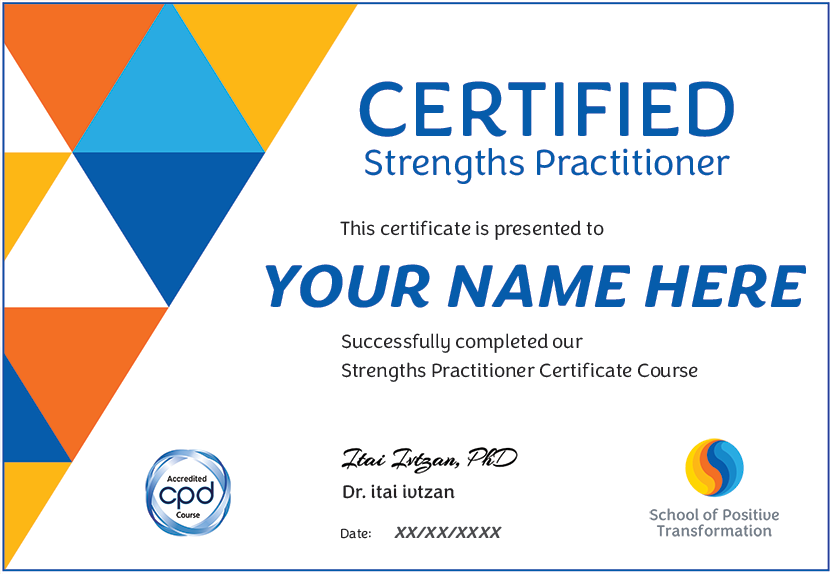Enrolled Students Worldwide
Estimated Study Hours
Sessions
Required Experience
Suitability
Adopting a strengths-based approach helps individuals, organizations, and groups, to optimize their performance and realize their potential. This course will take you on a journey to discover and integrate the use of your own strengths into your life. It will also provide you with practical tools, techniques, and confidence to support others on their journey to discovering and fully utilizing their strengths.
This training will be of value to anyone seeking to help others realize their potential. It will be especially beneficial to executive and organizational coaches, organizational leaders, managers, and HR staff, educators, parents, counsellors, and therapists. It will also be useful for those working in the charity sector, who are often challenged to do more with less.
Taking a strengths-based approach increases overall engagement at home, work, and school, leading to a more meaningful life. Using personal strengths increases resilience, well-being, and serves as a buffer against mental distress. However, unless we know what strengths are and how to use them, they can stay hidden in plain sight. This is where this life-changing course comes in. It will teach you everything you need to know about strengths, and how to find and apply them.
You are here for a reason. You feel the urge to positively change people's lives. This training will provide you with the knowledge and practical skills to turn your dream and vision into reality.

Certified Trainer and Coach
The course costs only $290 - for lifetime access - and you get our 30-day money-back guarantee.
Any questions for which you cannot find an answer on this webpage? We would love to answer your question via one of those options:
The Strengths Practitioner Certificate can be completed in as little as 6 weeks if you study one module per week. However, you can take as much time as you need to peacefully complete your studies in line with your availability – there is no time limit to this course.
This course is part of our school’s Community, an online Discussion Forum, where we invite you to ask questions, share your experiences with the course activities (both triumphs and challenges), connect with our course group facilitators, and build an inspiring relationship with like-minded fellow students. We have thousands of students as part of this community and it is filled with lively discussions and beautiful support.
Our course facilitators for this online community discussion forum are experienced Positive Psychologists, Meditation Teachers and Well-Being experts. We will make sure you feel welcomed, supported, and engaged.
Yes! We offer a weekly live Q&A session hosted in our community group. Please note that these live sessions are optional; they are not mandatory for your course completion. Full details and schedule included in the course online platform and in our online community forum.
Yes, absolutely. This training is accredited by the Continuing Professional Development (CPD), which accredits professional institutes and academic bodies.
The CPD provides your Certificate with a recognized accreditation from an international accrediting body that is respected globally.
Yes, absolutely. This training is recognized by Courses4Teachers Inc in partnership with the University of the Pacific and qualifies you for 4 units of professional development. This can be applied accepted by school districts across the United States . https://courses4teachers.net/school-of-positive-transformation/ for full details
Dr Ilona Boniwell is a pioneer and leading researcher in the field of Positive Psychology, having contributed to 8 books and over 50 research papers. This wealth of knowledge is used to support the content for this course.
You will need about 6 hours per week (per module), with 8 modules overall for the entire course. However, there is great flexibility and you can take as much time as you need to complete each module. Once you complete a module, it remains available for revision should you wish to return to a particular topic.
You can start the training immediately upon enrollment.
There are 2 assessment elements:
1. A few multiple-choice questions to answer as part of the online learning platform at the end of certain modules or sessions. We would like to ensure that its an enjoyable experience so if you don’t know the right answers, you can try again as many times as you need.
2. At the end of a couple of modules or sessions, you will find an assignment in which you will be asked to reflect on and write about your experiences with the activities - for example, how was it to run the activity? What were the main challenges? What did you learn? You will then submit the assignment for us to quickly review it. Research shows that writing about your experiences deepens the learning experience, so we encourage you to create a regular space and time for your reflective entries as you progress through the course.
Yes! All of the recorded videos include the option to turn on English Subtitles and download the transcript (written text) of the video.
Once you complete all sections of the course, your well-deserved Certificate will be delivered to you electronically as a PDF. This can be saved and printed locally if a hard copy is needed
In this module, we begin our exploration of Discovering Strengths in an unusual place: reflecting on our favorite superheroes! Next, we examine how strengths are defined and take a hands-on approach to experience what it is like to work in our strengths zone. We end the session with mindful listening and learning how to ‘strength spot.’ The purpose of this module is to introduce you to real-life, practical ways to experience and identify strengths before moving on to consider the theory underlying strengths in the next module.
In this module, we take our first steps toward learning how to identify strengths by exploring both informal and formal approaches. First, we explore the philosophies underpinning the theories and examine fundamental differences between traditional and strengths-based beliefs around learning. Next, we look at two methods of informal strengths identification, examining our past behaviors and interviewing others. Finally, we introduce three formal strengths assessment tools and discuss what they are, their histories, and their differences.
In this module, we focus our attention on the three formal assessment tools. We devote a full module to helping practitioners gain a better understanding and first-hand experience of using the three major formal assessment tools for strengths identification. In this introductory session, we also discuss some of the terminology you may encounter when talking about strengths.
In this module, we provide an overview of strengths research and take a closer look at evidence-based benefits and interventions. We end the module by exploring the connection between mindfulness and strengths and how they can be integrated into practice.
In this module, we consider how to talk about strengths within different one-to-one conversations, both formal and informal. Because we’ll be using the term ‘coaching’ throughout the module, we clarify what we mean by ‘coaching’ and provide a broad definition that covers a range of conversation types.
In this module, we slightly shift our focus from working with individuals to looking at the importance of bringing strengths to work and practical solutions on how to actually do this. We briefly touch on research-based benefits and statistics on performance, engagement, and productivity.
In this module, we move outward from the individual to consider ways to bring the strengths approach into teams and groups. In this introductory session, we explore why group and team work is important for teachers, trainers, coaches, or volunteers within the community. We also briefly examine significant benefits and statistics on teams who have received strengths-based interventions and the importance of virtual teams since the pandemic.
In this module, we discover, explore, and examine ways to bring the strengths back into everyday life and look at very broad ideas as to how to apply strengths at school, in parenting, with family and friends, and also in the community.

Our students find our courses inspiring and effective; watch their testimonials, they love it. And yet, we want you to feel safe as you enroll in a course. For that purpose, we offer a 30-day 100% money back guarantee. You can cancel your enrollment at any time within the first 30 days of the course, and receive a full refund.

Founder, School Of Positive Transformation
© Copyright 2023-2025. School of Positive Transformation. All rights reserved.